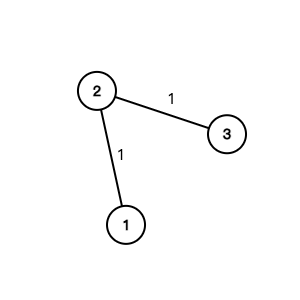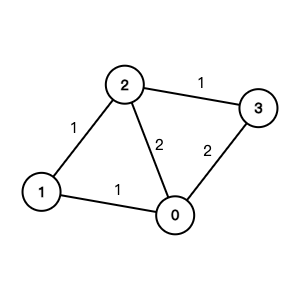Graph Shortest Path¶
Table of Contents¶
- 743. Network Delay Time (Medium)
- 778. Swim in Rising Water (Hard)
- 1631. Path With Minimum Effort (Medium)
- 787. Cheapest Flights Within K Stops (Medium)
- 1514. Path with Maximum Probability (Medium)
- 505. The Maze II (Medium) 👑
- 499. The Maze III (Hard) 👑
- 882. Reachable Nodes In Subdivided Graph (Hard)
- 1376. Time Needed to Inform All Employees (Medium)
- 1168. Optimize Water Distribution in a Village (Hard) 👑
- 1976. Number of Ways to Arrive at Destination (Medium)
743. Network Delay Time¶
-
LeetCode | LeetCode CH (Medium)
-
Tags: depth first search, breadth first search, graph, heap priority queue, shortest path
- Return the minimum time taken to reach all nodes in a network.
graph LR
1((1))
2((2))
3((3))
4((4))
2 --> |1| 1
2 --> |1| 3
3 --> |1| 4- Shortest Path Problem: Find the shortest path between two vertices in a graph.
- Dijkstra's Algorithm
- Shortest path algorithm
- Weighted graph (non-negative weights)
- Data Structure: Heap; Hash Set
- Time Complexity: O(E * logV)
- Space Complexity: O(V)
import heapq
from collections import defaultdict
from typing import List
# Dijkstra - Set
def networkDelayTime1(times: List[List[int]], n: int, k: int) -> int:
graph = defaultdict(list)
for u, v, w in times:
graph[u].append((v, w))
heap = [(0, k)]
visit = set()
t = 0
while heap:
w1, n1 = heapq.heappop(heap)
if n1 in visit:
continue
visit.add(n1)
t = w1
for n2, w2 in graph[n1]:
heapq.heappush(heap, (w1 + w2, n2))
return t if len(visit) == n else -1
# Dijkstra - Dict
def networkDelayTime2(times: List[List[int]], n: int, k: int) -> int:
graph = defaultdict(list)
for u, v, w in times:
graph[u].append((v, w))
heap = [(0, k)]
dist = defaultdict(int)
while heap:
w1, n1 = heapq.heappop(heap)
if n1 in dist:
continue
dist[n1] = w1
for n2, w2 in graph[n1]:
heapq.heappush(heap, (w1 + w2, n2))
return max(dist.values()) if len(dist) == n else -1
# Bellman-Ford
def networkDelayTimeBF(times: List[List[int]], n: int, k: int) -> int:
delay = {i: float("inf") for i in range(1, n + 1)}
delay[k] = 0
for _ in range(n - 1):
for u, v, t in times:
delay[v] = min(delay[v], delay[u] + t)
max_delay = max(delay.values())
return max_delay if max_delay < float("inf") else -1
# |--------------|-----------|--------|
# | Approach | Time | Space |
# |--------------|-----------|--------|
# | Dijkstra | O(E*logV) | O(V+E) |
# | Bellman-Ford | O(E*V) | O(V) |
# |--------------|-----------|--------|
if __name__ == "__main__":
times = [[2, 1, 1], [2, 3, 1], [3, 4, 1]]
n = 4
k = 2
print(networkDelayTime1(times, n, k)) # 2
print(networkDelayTime2(times, n, k)) # 2
print(networkDelayTimeBF(times, n, k)) # 2
778. Swim in Rising Water¶
-
LeetCode | LeetCode CH (Hard)
-
Tags: array, binary search, depth first search, breadth first search, union find, heap priority queue, matrix
- Return the minimum time when you can reach the target.

import heapq
from typing import List
# Dijkstra's
def swimInWater(grid: List[List[int]]) -> int:
n = len(grid)
visited = set()
minHeap = [(grid[0][0], 0, 0)]
directions = [(0, 1), (0, -1), (1, 0), (-1, 0)]
visited.add((0, 0))
while minHeap:
time, r, c = heapq.heappop(minHeap)
if r == n - 1 and c == n - 1:
return time
for dr, dc in directions:
nr, nc = r + dr, c + dc
if nr in range(n) and nc in range(n) and (nr, nc) not in visited:
visited.add((nr, nc))
heapq.heappush(minHeap, (max(time, grid[nr][nc]), nr, nc))
grid = [
[0, 1, 2, 3, 4],
[24, 23, 22, 21, 5],
[12, 13, 14, 15, 16],
[11, 17, 18, 19, 20],
[10, 9, 8, 7, 6],
]
print(swimInWater(grid)) # 16
1631. Path With Minimum Effort¶
-
LeetCode | LeetCode CH (Medium)
-
Tags: array, binary search, depth first search, breadth first search, union find, heap priority queue, matrix
- Return the minimum effort required to travel from the top-left to the bottom-right corner.
import heapq
from typing import List
# Prim
def minimumEffortPath(heights: List[List[int]]) -> int:
m, n = len(heights), len(heights[0])
directions = [(0, 1), (1, 0), (0, -1), (-1, 0)]
visited = [[False] * n for _ in range(m)]
heap = [(0, 0, 0)] # (effort, row, col)
while heap:
effort, r, c = heapq.heappop(heap)
if visited[r][c]:
continue
if r == m - 1 and c == n - 1:
return effort
visited[r][c] = True
for dr, dc in directions:
nr, nc = r + dr, c + dc
if 0 <= nr < m and 0 <= nc < n and not visited[nr][nc]:
updated = max(effort, abs(heights[r][c] - heights[nr][nc]))
heapq.heappush(heap, (updated, nr, nc))
return -1
heights = [[1, 2, 2], [3, 8, 2], [5, 3, 5]]
print(minimumEffortPath(heights)) # 2
787. Cheapest Flights Within K Stops¶
-
LeetCode | LeetCode CH (Medium)
-
Tags: dynamic programming, depth first search, breadth first search, graph, heap priority queue, shortest path
- Return the cheapest price from
srctodstwith at mostKstops.
graph TD
0((0))
1((1))
2((2))
3((3))
0 --> |100| 1
1 --> |600| 3
1 --> |100| 2
2 --> |100| 0
2 --> |200| 3import heapq
from collections import defaultdict
from typing import List
# Bellman-Ford
def findCheapestPriceBF(
n: int, flights: List[List[int]], src: int, dst: int, k: int
) -> int:
prices = [float("inf") for _ in range(n)]
prices[src] = 0
for _ in range(k + 1):
temp = prices[:]
for u, v, w in flights:
temp[v] = min(temp[v], prices[u] + w)
prices = temp
return prices[dst] if prices[dst] != float("inf") else -1
# Dijkstra
def findCheapestPriceDijkstra(
n: int, flights: List[List[int]], src: int, dst: int, k: int
) -> int:
graph = defaultdict(list)
for u, v, w in flights:
graph[u].append((v, w))
heap = [(0, src, 0)] # (price, city, stops)
visited = defaultdict(int) # {city: stops}
while heap:
price, city, stops = heapq.heappop(heap)
if city == dst:
return price
if stops > k:
continue
if city in visited and visited[city] <= stops:
continue
visited[city] = stops
for neighbor, cost in graph[city]:
heapq.heappush(heap, (price + cost, neighbor, stops + 1))
return -1
# |------------|------------------|---------|
# | Approach | Time | Space |
# |------------|------------------|---------|
# |Bellman-Ford| O(k * E) | O(n) |
# | Dijkstra | O(E * log(V)) | O(n) |
# |------------|------------------|---------|
n = 4
flights = [[0, 1, 100], [1, 2, 100], [2, 0, 100], [1, 3, 600], [2, 3, 200]]
src = 0
dst = 3
k = 1
print(findCheapestPriceBF(n, flights, src, dst, k)) # 700
print(findCheapestPriceDijkstra(n, flights, src, dst, k)) # 700
1514. Path with Maximum Probability¶
-
LeetCode | LeetCode CH (Medium)
-
Tags: array, graph, heap priority queue, shortest path
import heapq
from collections import defaultdict
from typing import List
# Dijkstra - Dict
def maxProbability1(
n: int,
edges: List[List[int]],
succProb: List[float],
start_node: int,
end_node: int,
) -> float:
graph = defaultdict(list)
for i, (u, v) in enumerate(edges):
graph[u].append((v, succProb[i]))
graph[v].append((u, succProb[i]))
heap = [(-1, start_node)]
max_prob = {i: 0.0 for i in range(n)}
max_prob[start_node] = 1.0
while heap:
p1, n1 = heapq.heappop(heap)
if n1 == end_node:
return -p1
for n2, p2 in graph[n1]:
p2 *= -p1
if p2 > max_prob[n2]:
max_prob[n2] = p2
heapq.heappush(heap, (-p2, n2))
return 0.0
# Dijkstra - Set
def maxProbability2(
n: int,
edges: List[List[int]],
succProb: List[float],
start_node: int,
end_node: int,
) -> float:
graph = defaultdict(list)
for i, (u, v) in enumerate(edges):
graph[u].append((v, succProb[i]))
graph[v].append((u, succProb[i]))
heap = [(-1, start_node)]
visited = set()
while heap:
p1, n1 = heapq.heappop(heap)
visited.add(n1)
if n1 == end_node:
return -p1
for n2, p2 in graph[n1]:
if n2 not in visited:
heapq.heappush(heap, (p1 * p2, n2))
return 0.0
# |------------|-----------|-----------|
# | Approach | Time | Space |
# |------------|-----------|-----------|
# | Dijkstra | O(E log V)| O(E) |
# |------------|-----------|-----------|
n = 3
edges = [[0, 1], [1, 2], [0, 2]]
succProb = [0.5, 0.5, 0.2]
start = 0
end = 2
print(maxProbability1(n, edges, succProb, start, end)) # 0.25
print(maxProbability2(n, edges, succProb, start, end)) # 0.25
505. The Maze II¶
-
LeetCode | LeetCode CH (Medium)
-
Tags: array, depth first search, breadth first search, graph, heap priority queue, matrix, shortest path
import heapq
from typing import List
# Dijkstra
def shortestDistance(
maze: List[List[int]], start: List[int], destination: List[int]
) -> int:
directions = [(0, 1), (0, -1), (1, 0), (-1, 0)]
m, n = len(maze), len(maze[0])
dist = [[float("inf")] * n for _ in range(m)]
dist[start[0]][start[1]] = 0
heap = [(0, start[0], start[1])]
while heap:
d, r, c = heapq.heappop(heap)
if [r, c] == destination:
return d
for dr, dc in directions:
nr, nc, nd = r, c, d
while (
0 <= nr + dr < m
and 0 <= nc + dc < n
and maze[nr + dr][nc + dc] == 0
):
nr += dr
nc += dc
nd += 1
if nd < dist[nr][nc]:
dist[nr][nc] = nd
heapq.heappush(heap, (nd, nr, nc))
return -1
maze = [
[0, 0, 1, 0, 0],
[0, 0, 0, 0, 0],
[0, 0, 0, 1, 0],
[1, 1, 0, 1, 1],
[0, 0, 0, 0, 0],
]
start = [0, 4]
destination = [4, 4]
print(shortestDistance(maze, start, destination)) # 12
499. The Maze III¶
-
LeetCode | LeetCode CH (Hard)
-
Tags: array, string, depth first search, breadth first search, graph, heap priority queue, matrix, shortest path
import heapq
from typing import List
# Dijkstra
def findShortestWay(
maze: List[List[int]], ball: List[int], hole: List[int]
) -> str:
directions = [(-1, 0, "u"), (1, 0, "d"), (0, -1, "l"), (0, 1, "r")]
m, n = len(maze), len(maze[0])
dist = [[float("inf")] * n for _ in range(m)]
dist[ball[0]][ball[1]] = 0
paths = [[""] * n for _ in range(m)]
paths[ball[0]][ball[1]] = ""
heap = [(0, "", ball[0], ball[1])]
while heap:
d, path, x, y = heapq.heappop(heap)
if [x, y] == hole:
return path
for dx, dy, direction in directions:
nx, ny, nd = x, y, d
while (
0 <= nx + dx < m
and 0 <= ny + dy < n
and maze[nx + dx][ny + dy] == 0
):
nx += dx
ny += dy
nd += 1
if [nx, ny] == hole:
break
new_path = path + direction
if nd < dist[nx][ny] or (
nd == dist[nx][ny] and new_path < paths[nx][ny]
):
dist[nx][ny] = nd
paths[nx][ny] = new_path
heapq.heappush(heap, (nd, new_path, nx, ny))
return "impossible"
maze = [
[0, 0, 0, 0, 0],
[1, 1, 0, 0, 1],
[0, 0, 0, 0, 0],
[0, 1, 0, 0, 1],
[0, 1, 0, 0, 0],
]
ball = [4, 3]
hole = [0, 1]
print(findShortestWay(maze, ball, hole)) # "lul"
882. Reachable Nodes In Subdivided Graph¶
-
LeetCode | LeetCode CH (Hard)
-
Tags: graph, heap priority queue, shortest path
import heapq
from typing import List
# Dijkstra's
def reachableNodes(self, edges: List[List[int]], maxMoves: int, n: int) -> int:
graph = {i: {} for i in range(n)}
for u, v, cnt in edges:
graph[u][v] = cnt
graph[v][u] = cnt
heap = [(-maxMoves, 0)]
seen = {}
while heap:
moves, node = heapq.heappop(heap)
if node in seen:
continue
seen[node] = -moves
for nxt, cnt in graph[node].items():
movesLeft = -moves - cnt - 1
if nxt not in seen and movesLeft >= 0:
heapq.heappush(heap, (-movesLeft, nxt))
res = len(seen)
for u, v, cnt in edges:
res += min(seen.get(u, 0) + seen.get(v, 0), cnt)
return res
edges = [[0, 1, 10], [0, 2, 1], [1, 2, 2]]
maxMoves = 6
n = 3
print(reachableNodes(None, edges, maxMoves, n)) # 13
1376. Time Needed to Inform All Employees¶
-
LeetCode | LeetCode CH (Medium)
-
Tags: tree, depth first search, breadth first search
from collections import defaultdict, deque
from typing import List
# DFS
def numOfMinutesDFS(
n: int, headID: int, manager: List[int], informTime: List[int]
) -> int:
graph = defaultdict(list)
for i in range(n):
if manager[i] != -1:
graph[manager[i]].append(i)
def dfs(node):
time = 0
for sub in graph[node]:
time = max(time, dfs(sub))
return time + informTime[node]
return dfs(headID)
# BFS
def numOfMinutesBFS(
n: int, headID: int, manager: List[int], informTime: List[int]
) -> int:
graph = defaultdict(list)
for i in range(n):
if manager[i] != -1:
graph[manager[i]].append(i)
q = deque([(headID, 0)])
max_time = 0
while q:
node, time = q.popleft()
max_time = max(max_time, time)
for sub in graph[node]:
q.append((sub, time + informTime[node]))
return max_time
n = 6
headID = 2
manager = [2, 2, -1, 2, 2, 2]
informTime = [0, 0, 1, 0, 0, 0]
print(numOfMinutesDFS(n, headID, manager, informTime)) # 1
print(numOfMinutesBFS(n, headID, manager, informTime)) # 1
1168. Optimize Water Distribution in a Village¶
-
LeetCode | LeetCode CH (Hard)
-
Tags: union find, graph, heap priority queue, minimum spanning tree
-

-

import heapq
from collections import defaultdict
from typing import List
# Prim
def minCostToSupplyWater1(
n: int, wells: List[int], pipes: List[List[int]]
) -> int:
graph = defaultdict(list)
for h1, h2, cost in pipes:
graph[h1].append((h2, cost))
graph[h2].append((h1, cost))
# Add the cost of the wells to the graph (house 0)
for i in range(n):
graph[0].append((i + 1, wells[i]))
graph[i + 1].append((0, wells[i]))
visited = set([0])
heap = [(cost, dest) for dest, cost in graph[0]]
heapq.heapify(heap)
cost = 0
while heap:
c1, n1 = heapq.heappop(heap)
if n1 in visited:
continue
visited.add(n1)
cost += c1
for n2, c2 in graph[n1]:
if n2 not in visited:
heapq.heappush(heap, (c2, n2))
return cost
# Kruskal
def minCostToSupplyWater2(
n: int, wells: List[int], pipes: List[List[int]]
) -> int:
par = list(range(n + 1))
rank = [0] * (n + 1)
def find(n):
p = par[n]
while p != par[p]:
par[p] = par[par[p]]
p = par[p]
return p
def union(n1, n2):
p1, p2 = find(n1), find(n2)
if p1 != p2:
if rank[p1] < rank[p2]:
par[p1] = p2
elif rank[p1] > rank[p2]:
par[p2] = p1
else:
par[p1] = p2
rank[p2] += 1
return True
return False
graph = [(c, 0, i + 1) for i, c in enumerate(wells)]
for h1, h2, c in pipes:
graph.append((c, h1, h2))
graph.sort()
cost = 0
for c, h1, h2 in graph:
if union(h1, h2):
cost += c
return cost
# |------------|------------------|---------|
# | Approach | Time | Space |
# |------------|------------------|---------|
# | Prim | O((V + E) log V) | O(V + E)|
# | Kruskal | O(E log E) | O(V + E)|
# |------------|------------------|---------|
n = 3
wells = [1, 2, 2]
pipes = [[1, 2, 1], [2, 3, 1]]
print(minCostToSupplyWater1(n, wells, pipes)) # 3
print(minCostToSupplyWater2(n, wells, pipes)) # 3
1976. Number of Ways to Arrive at Destination¶
-
LeetCode | LeetCode CH (Medium)
-
Tags: dynamic programming, graph, topological sort, shortest path
import heapq
from typing import List
# Dijkstra
def countPaths(n: int, roads: List[List[int]]) -> int:
mod = 10**9 + 7
graph = [[] for _ in range(n)]
for u, v, w in roads:
graph[u].append((v, w))
graph[v].append((u, w))
dist = [float("inf") for _ in range(n)]
dist[0] = 0
count = [0 for _ in range(n)]
count[0] = 1
heap = [(0, 0)]
while heap:
d, u = heapq.heappop(heap)
if d > dist[u]:
continue
for v, w in graph[u]:
if dist[u] + w < dist[v]:
dist[v] = dist[u] + w
count[v] = count[u]
heapq.heappush(heap, (dist[v], v))
elif dist[u] + w == dist[v]:
count[v] += count[u]
count[v] %= mod
return count[-1]
n = 7
roads = [
[0, 6, 7],
[0, 1, 2],
[1, 2, 3],
[1, 3, 3],
[6, 3, 3],
[3, 5, 1],
[6, 5, 1],
[2, 5, 1],
[0, 4, 5],
[4, 6, 2],
]
print(countPaths(n, roads)) # 4